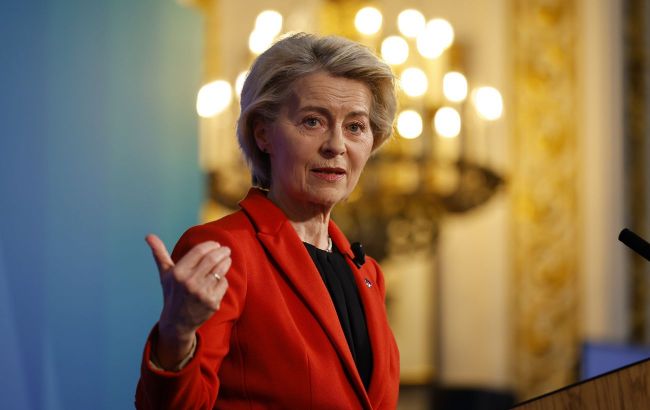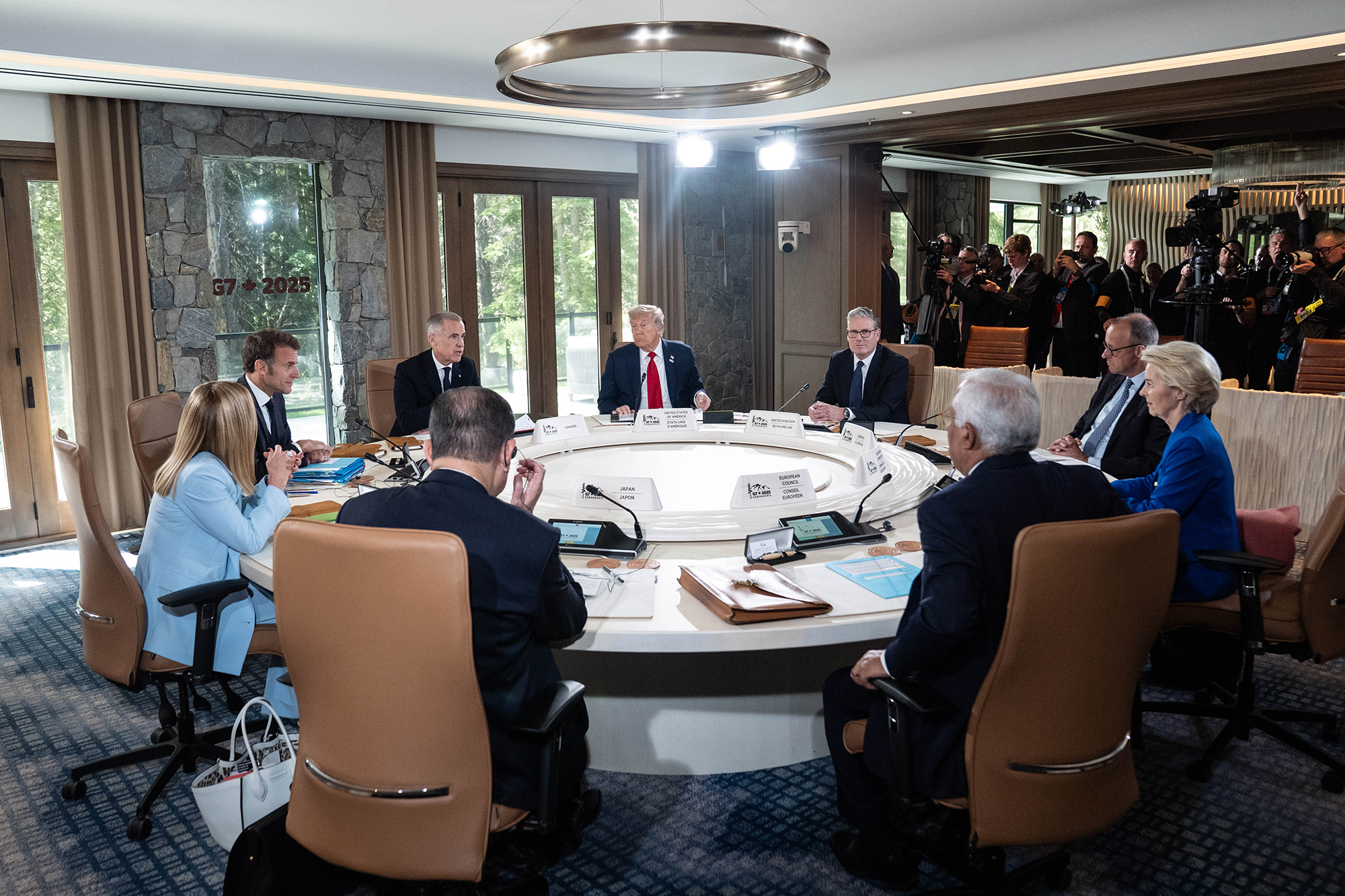Sanctions, oil, shadow fleet. Can the EU crush Russia's economy?
 European Commission President Ursula von der Leyen (Getty Images)
European Commission President Ursula von der Leyen (Getty Images)
The EU plans to approve a new package of sanctions against Russia next week. But for now, there is no certainty that it will be as devastating as expected a month ago.
Key questions:
- What might be included in the 18th package of sanctions?
- Why is the EU not ready to lower the price cap for Russian oil?
- Who within the EU opposes tightening oil sanctions?
The preparation of the 18th sanctions package in the EU began almost immediately after the adoption of the 17th package of restrictions, which was rather weak. The new package was announced as a serious response to Russia's refusal to agree to a ceasefire. However, Donald Trump has made it clear that he does not intend to increase pressure on Moscow for now, still hoping for some outcome from negotiations. Without US support, the EU may not risk taking independent action.
What was planned and what remains
The new sanctions package is supposed to cover the energy and financial sectors, and the supply of dual-use goods and technologies. It proposes a ban on any transactions involving both Nord Stream pipelines, as well as the shadow fleet Russia uses to transport oil, adding to the sanctions list 77 oil tankers.
Also, a ban is proposed on the import to third countries of petroleum products made from Russian oil. And most importantly, the package initially included lowering the oil price cap for Russian exports from $60 to $45 per barrel.
The original idea of the entire package was to reduce Russia's revenues from energy sales and to strengthen the financial isolation of the aggressor state. The new package was supposed to become one of the toughest in place so far.
"Strength is the only language Russia understands," said European Commission President Ursula von der Leyen while presenting the contents of the upcoming sanctions package on June 11.
G7 is not yet ready to tighten sanctions
Lowering the oil price cap, which is the most effective tool for reducing Russia's revenues, must be agreed upon jointly by the G7 countries. But at the G7 summit held this week in Canada, no agreement was reached on lowering the cap. The United States opposed it, while EU and UK representatives did not risk taking the initiative.

G7 summit in Canada (photo: Getty Images)
The war between Israel and Iran has become an obstacle to lowering the oil price cap, as it has driven oil prices up.
In the past two weeks, Brent crude has risen by $10. It now costs nearly $77 per barrel. Russian Urals crude increased from $60.6 to $74.7.
The EU's approval of a new oil price cap at $45 per barrel currently seems unrealistic. If it does not happen, the idea of suffocating Moscow’s revenues will fail.
Why can't the cap be lowered?
A new oil price cap of $45 would, of course, significantly reduce Russia’s oil revenues, but would not nullify them.
A price cap of $30, which Ukraine proposed, could make Russian oil exports completely unprofitable. This is roughly close to the average marginal cost of oil production at the wellhead. With transportation and handling to the port taken into account, the average cost would be $45.
"A price cap at $30 is slightly above the average cost of production. At that level, production would still be profitable for Russian companies, but the budget would receive almost nothing. And they cannot stop exporting, because there is nowhere else to get money (foreign currency- ed.)," said Ukraine’s Commissioner for Sanctions Policy, Vladyslav Vlasiuk, in a comment to RBC-Ukraine.
He added that in order to bypass the current $60 cap, Russia has created a shadow fleet, which allows it to sell oil at or above the cap. Bypassing the sanctions brings Russia no less than $16 billion per year.
Currently, the shadow fleet includes over 650 vessels that do not require services from G7 countries to operate. "The shadow fleet is not a Russian invention. It is also used for Iranian and Venezuelan oil. 21% of the vessels working with Iranian oil also work with Russian oil," Vlasiuk said.
More than 500 tankers are under sanctions from the US, Canada, the UK, or the EU (from at least one of them), which makes it possible to remove about 40-50% of the shadow vessels from the market. But the rest continue to sail between Russian ports and India, China, Türkiye, and other countries. Moreover, Russia is hiring new tankers to transport oil, which allows it to maintain export volumes, Vlasiuk noted.
How to maximize the impact of oil sanctions
To maximize the impact of the price restrictions, the ability to use the shadow fleet must be greatly diminished. "For the price cap lowering to be effective, the shadow fleet must be squeezed out. And we must ensure that the white fleet does not violate the cap. Otherwise, the effect will be zero, regardless of the cap," Vlasiuk said.
.jpg)
Ukraine’s Presidential Commissioner for Sanctions Policy, Vladyslav Vlasiuk (photo: Vitalii Nosach/RBC-Ukraine)
According to him, if 25% of Russian oil currently transported by the white fleet were sold at the new $45 per barrel cap, Russia would lose an additional $6.3 billion in revenues annually.
"With the share of the shadow fleet in transporting Russian oil reduced to 50%, 25%, 0%, and with compliance with the price cap, Russia's losses would increase to $12.6, $18.9, and finally $25.2 billion per year," he said.
EU delays in lowering the price cap
Why does the EU not adopt Ukraine's proposal to cap oil at $30 per barrel, only considering $45? The director of the Psyche Center, Hennadii Riabtsev, believes the reason is that a number of countries have economic interests in transporting Russian oil.
"I think certain EU countries – for example, Greece, Cyprus, Malta – have economic interests. Perhaps others as well, where there are large companies engaged in or connected to maritime transport. A consensus of all EU countries is needed for the EU decision on the price cap, and that consensus is lacking," Riabtsev told RBC-Ukraine.
Greece, Cyprus, and Malta have opposed restrictions on the transport of Russian oil since 2022. "These countries were opposed even when the $60 price cap was introduced in 2022. They feared that such restrictions would seriously affect their revenues from transportation and logistics services," Riabtsev noted.
***
If the EU still implements all of its plans, despite the lack of US support, then Russia may receive - not a fatal, but still a fairly serious - blow to its economy. The recession point, which is already officially acknowledged in Russia, will likely be crossed. And then there will be risks of shutting down not only metallurgical enterprises, as already warned by the head of Severstal, but also significant reductions in other sectors, inevitably cutting state revenues that Russia needs to continue the war.

